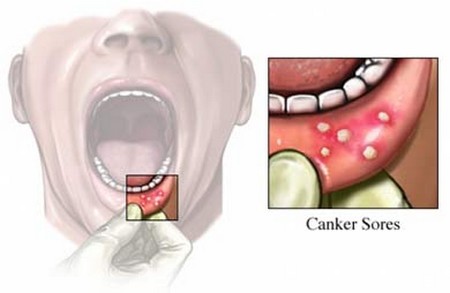Canker sores affect anywhere from 20 to 50 percent of the population, may be an inherited trait, and are more common among women than men. Statistics show that if you’ve had a canker sore before, you’ll probably get one again. Experts differ on the exact cause of these mouth ulcers, but they do agree the condition is not caused by a virus or bacteria, and is not contagious. The sores may be a reaction to certain foods, emotional states like fatigue and tension, or triggers like menstruation or injury.
It begins as a small blister, which bursts and becomes encircled by a bright red inflammation. It may take up to two weeks for the sore to heal, which it usually does on its own. In the meantime, there are ways to make yourself more comfortable and, perhaps, speed the healing process.

- Avoid Irritating foods. Tomatoes, citrus fruits, nuts, salsa, and chips are just some examples of foods that are salty, acidic, spicy, or abrasive. These can all aggravate canker sores. Stick to soft, bland food until the sores heal. Experts especially recommend yogurt.
- Brush gently. Don’t scrub your gums, and avoid damaging the protective membrane that covers the sore.
- Try some home-grown remedies. Several homemade mouth rinses may coat the sores and relieve the pain. Try milk, milk of magnesia, or water with baking soda, salt, or hydrogen peroxide.
- Visit your pharmacy. Several over-the-counter ointments have numbing or waterproofing properties to make you feel better and speed healing.
- See a Periodontist. A jagged tooth, braces, or dentures could be making your canker sore even worse. Make sure there is no irritant in your mouth to prolong your discomfort.
- The long-range plan for canker sores
- If you frequently suffer from canker sores, visit your doctor. She can run blood and allergy tests to see if you have a preventable cause for the condition. A vitamin deficiency or food allergy is easy to fix.
- Practice good oral hygiene. Gentle, thorough cleaning of your teeth and gums will keep your mouth healthy and in good shape to fight infection.
- Take your prescription. Your doctor may prescribe a treatment of antibiotics, such as tetracycline, or a prescription-strength topical anesthetic.
- Gauge your emotions. If you find that stress, anxiety, anger, or sadness brings on the canker sores, learn to control these feelings as much as possible. Your doctor can advise you of techniques and help groups.